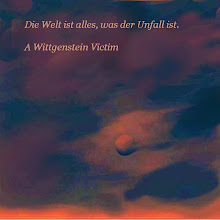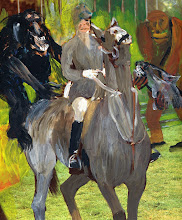Scene: A baroque hall of mirrors on the outskirts of fin de siècle Vienna. Two gentleman of the first society in formal dress, but without their tailcoats, are standing at opposite ends of the long hall. Their voices echo across the void. They have just come from a ball or a soirée in a town palace or an urgent consultation at the Hofburg but not the same one. Their tailcoats lie in the exact same position on the ground next to them. The distance is so great neither can be sure he isn’t looking at his own reflection.
Count A: The enemy is nothing personal, it is the condition of one’s existence, the only natural boundary to one’s will besides the exhaustion one carries about. Without an enemy one withers between agues of languor and seizures of enthusiasm. One’s enemy can tire one without ever laying eyes on it, without even engaging it, but somehow there is for the enemy the same intangible boundary, which it of course tries to violate as often as it dares. But it always is a dare. Not every generation of the enemy has nerves equal to the dare. One need not meet one’s enemy; it is highly undesirable to do so, yet the lineage is as certain as if one had been brought together in an arranged marriage. The enemy is the supreme habit. One knows the genre. Like every habit it belongs to the order of the world only more so. It must also observe a délai de carence like any other habit. The Kabbalah calls it the other side. Like most habits it may begin as a striving for perfection and turn into a tyrannical routine. There is no habit like the enemy for drawing one towards perfection. Every move in the direction of the enemy is a move towards perfection; every move away from it is a fall from grace.
Count B: A will beholden to the will of an enemy is freer or as free as a will, which denies itself. The relationship is not transitive nor stricto sensu reciprocal. Krishna revealed this dialectic of the enemy to Arjuna in the Bhagavad Gita. Speaking to or speaking about the enemy is a habit. One is hypnotized by the enemy’s suada. Habits are character, character is ethics – or habits are ethics, ethics are character, character is will, will is unconditional and immutable and timeless. Remorse is the emotion, which precedes and accompanies corrections in the reading of the will – and the motives, which are its instructions to the empirical character. One’s enemy is the reverse or the antidote to oneself. Every action of the enemy is the manifestation of its immutable will, any or all of its actions may wrongly interpret this will, the enemy may appear unlike itself for a good while, even indefinitely, this period in which the enemy does not recognize its will, obfuscates one’s own will in equal measure, even though no such effect is intended. One must pray that the enemy be guided by its faculty of reason to finally recognize its own will, because its clarity will illuminate one’s own reason. On rare occasions when the enemy remains stubbornly misguided disaster takes place all around like in the Eulenburg affair. Or it is narrowly avoided as in the case of Colonel Redl.
Clarity cannot be achieved through rational means alone. A science of logic is a chimera. But the absence of logic is also a chimera. Logic has an intermittence of the heart. Clarity of thought only exists within the precise radius of the enemy. The enemy in the abstract sense is negation. As wills are not subject to change or influence there can be no thought of losing one’s enemy, if one is so fortunate as to have been born into a will which is existentially bound by the will of another. Bondage of wills differs from bondage between empirical characters. In the world of the will, bondage means an enhancement of the original and irreducible freedom of the will. A will with an accurate enemy will tends to err less in the discovery of itself; once discovered to stray less from its line, so being true to itself. My own economy serves me as it does my inimicus – never eat before you are hungry and always stop before you are full.
A long silence is broken by three shots of a revolver.
Count A: The enemy is nothing personal, it is the condition of one’s existence, the only natural boundary to one’s will besides the exhaustion one carries about. Without an enemy one withers between agues of languor and seizures of enthusiasm. One’s enemy can tire one without ever laying eyes on it, without even engaging it, but somehow there is for the enemy the same intangible boundary, which it of course tries to violate as often as it dares. But it always is a dare. Not every generation of the enemy has nerves equal to the dare. One need not meet one’s enemy; it is highly undesirable to do so, yet the lineage is as certain as if one had been brought together in an arranged marriage. The enemy is the supreme habit. One knows the genre. Like every habit it belongs to the order of the world only more so. It must also observe a délai de carence like any other habit. The Kabbalah calls it the other side. Like most habits it may begin as a striving for perfection and turn into a tyrannical routine. There is no habit like the enemy for drawing one towards perfection. Every move in the direction of the enemy is a move towards perfection; every move away from it is a fall from grace.
Count B: A will beholden to the will of an enemy is freer or as free as a will, which denies itself. The relationship is not transitive nor stricto sensu reciprocal. Krishna revealed this dialectic of the enemy to Arjuna in the Bhagavad Gita. Speaking to or speaking about the enemy is a habit. One is hypnotized by the enemy’s suada. Habits are character, character is ethics – or habits are ethics, ethics are character, character is will, will is unconditional and immutable and timeless. Remorse is the emotion, which precedes and accompanies corrections in the reading of the will – and the motives, which are its instructions to the empirical character. One’s enemy is the reverse or the antidote to oneself. Every action of the enemy is the manifestation of its immutable will, any or all of its actions may wrongly interpret this will, the enemy may appear unlike itself for a good while, even indefinitely, this period in which the enemy does not recognize its will, obfuscates one’s own will in equal measure, even though no such effect is intended. One must pray that the enemy be guided by its faculty of reason to finally recognize its own will, because its clarity will illuminate one’s own reason. On rare occasions when the enemy remains stubbornly misguided disaster takes place all around like in the Eulenburg affair. Or it is narrowly avoided as in the case of Colonel Redl.
Clarity cannot be achieved through rational means alone. A science of logic is a chimera. But the absence of logic is also a chimera. Logic has an intermittence of the heart. Clarity of thought only exists within the precise radius of the enemy. The enemy in the abstract sense is negation. As wills are not subject to change or influence there can be no thought of losing one’s enemy, if one is so fortunate as to have been born into a will which is existentially bound by the will of another. Bondage of wills differs from bondage between empirical characters. In the world of the will, bondage means an enhancement of the original and irreducible freedom of the will. A will with an accurate enemy will tends to err less in the discovery of itself; once discovered to stray less from its line, so being true to itself. My own economy serves me as it does my inimicus – never eat before you are hungry and always stop before you are full.
A long silence is broken by three shots of a revolver.

















.jpg)














No comments:
Post a Comment